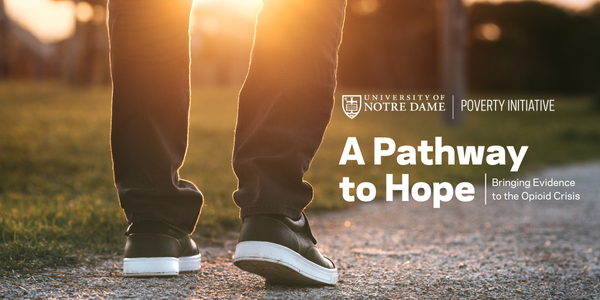In the second session of Raising Resilient Children, “Early Childhood Development and Catholic Social Teaching,” Neil Boothby, director of the Global Center of the Development of the Whole Child welcomed guest Father Lou DelFra, C.S.C., director of Pastoral Life at the Alliance for Catholic Education, for a conversation that delved deeply into the harmonious relationship between science and faith, emphasizing the critical first thousand days of a child’s life. The informative and transformative dialogue revealed the importance of combining early childhood development insights with Catholic social traditions to foster resilience and well-being in children, particularly those facing adversity.
This unique session from the ThinkND series aimed at shedding light on the profound impact early years have on future outcomes by intertwining scientific breakthroughs in neuroscience with the tenets of faith upheld by the Catholic Church. Neil Boothby, esteemed director of the Global Center for the Development of the Whole Child at the University of Notre Dame, facilitated the discussion with expertise and profound personal insight, beginning with a moving recount of the birth of his own child, Peter. The silent entrance of his son into the world provided a stark moment of awareness regarding the inherent individuality of every child and the immense parental responsibility to nurture and guide them.
Father Lou DelFra provided an enriching perspective from the viewpoint of Catholic social teachings, focusing on the inherent dignity of the human person and the roles and responsibilities of parents and communities. He highlighted the family unit’s status as the “domestic church,” the primary educator, and the fundamental need for responsive caregiving. Father Lou emphasized the right to growing up within nurturing communities that reflect the Church’s commitment to caring for the vulnerable, paralleling the protective and nurturing role demonstrated by Mary in the Catholic tradition.
Through their conversation, Neil and Father Lou revealed the compatibility and complementarity of faith and science in shaping the approach to childhood development. Enlightening their audience on the astonishing pace at which the brain develops within the first few years of life, Neil shared that a child’s neurological framework is constructed at a staggering rate of 250,000 nerve cells per minute. This highlighted the utmost importance of responsive caregiving in facilitating optimal brain development, as both responsive interactions and adequate nutrition are crucial in building brain capacity, shaping neuron development, and ensuring children understand their world as a predictable place.
Addressing the gravity of neglect, abuse, and adversity on children’s intellectual capacity and life expectancies, the discussion pointed to the monumental 30 million word gap that often reflects the impact of poverty on development. Such adversities leave epigenetic signatures that affect biology, leading to either resilience or risk, further reinforcing the need for intentional, nurturing care. Neil Boothby made a compelling case for prioritizing investment in early childhood development, drawing a clear line from the well-being of children to broader societal issues such as poverty alleviation.
In an increasingly fragmented society, the speakers tackled the challenges of loneliness and isolation, particularly among young people. They pondered social media’s role in augmenting this issue and the ensuing call for the Church and education institutions to foster a greater sense of community and connection. Father Lou reminded listeners of the Christian theology based on relationships, with the doctrine of the Trinity serving as the ultimate symbol for love and interconnection in shaping human identity.
Highlighting the measurable impact of Notre Dame’s engagement in countries like Haiti and Kenya, the conversation celebrated the influential role of the Church in fostering mindset shifts and encouraging nurturing behavior. This involvement operates in tandem with the efforts of the Global Center, where Boothby’s team endeavors to craft pathways out of adversity for vulnerable children through education and support systems pioneered in these faith-based communities.
Neil and Father Lou embraced the notion that faith-based institutions like the Catholic Church could serve as vectors for delivering developmental and nurturing messages to parents and communities, with Notre Dame’s commitment bolstering these efforts substantially. The Global Center for the Development of the Whole Child represents the University’s tangible dedication to this mission.
As the episode concluded, both Neil and Father Lou reiterated their joint appreciation for having the opportunity to explore and discuss such profound topics. Neil encouraged the audience to remain engaged with the Global Center and the ThinkND Learning Community, as these conversations and initiatives remain vitally important.
The episode, rich in its blend of science and spirituality, reinforces the Global Center for the Development of the Whole Child’s commitment to offering insightful and thought-provoking research that speaks to the heart of human development and care for the “least of these.” The resounding message echoed between the lines of the conversation was a call to action, encouraging parents, caregivers, and communities to embrace the sacred responsibility of nurturing resilient children, built upon the firm foundations of early childhood development insights and the compassionate ethos of Catholic Social Teaching.





